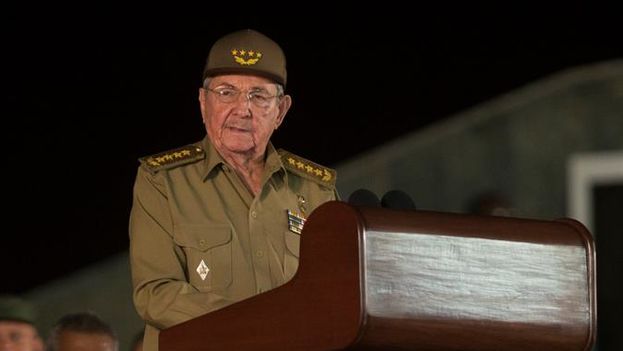
![]() 14ymedio, Havana, 3 December 2016 – A somewhat hoarse and visibly tired Raul Castro gave the main speech at the final massive act of homage to Fidel Castro in the Antonio Maceo Plaza in Santiago de Cuba. The general president focused his speech on the voluntarism espoused by his brother and highlighted the phrase “Sí se puede” – Yes we can – as a summary of the actions of the fallen leader.
14ymedio, Havana, 3 December 2016 – A somewhat hoarse and visibly tired Raul Castro gave the main speech at the final massive act of homage to Fidel Castro in the Antonio Maceo Plaza in Santiago de Cuba. The general president focused his speech on the voluntarism espoused by his brother and highlighted the phrase “Sí se puede” – Yes we can – as a summary of the actions of the fallen leader.
Those who expected a speech with definitions of the future direction the country will take after the death of the historic leader, had to be satisfied with a speech that the president devoted to reviewing the national history of the last six decades.
Raul Castro recalled the main events in the life of the country while his brother was in command. The Cuban president stressed the difficult years of the Special Period, when the Soviet Union disappeared and the island lost the millions in subsidies that had supported its economy.
Raul Castro said that Fidel Castro’s name and figure will not be used to name public places, streets or plazas, nor to raise monuments, busts or statues in his memory. A desire expressed by the deceased, who, according to the president, “rejected every kind of manifestation of a cult of personality.”
In the next session of the National Assembly there will be proposals to ensure that Fidel Castro’s desire in this regard is honored, announced his brother
At the event, which attracted thousands of people, representatives of pro-government organizations took the floor, including the Workers’ Central Union of Cuba (CTC), the Union of Young Communists (UJC) and the University Student Federation (FEU).
“Today we must say that children, teenagers and young people aspire to be like Fidel,” emphasized the first secretary of the Young Communist Union, Suselys Morfa, popularly known as the “millionaire psychologist” for her combative attitude during the Americas Summit in Panama.
Miguel Barnet, president of the Writers and Artists Union of Cuba (UNEAC) said that “Fidel broke the traditional political scheme” and added that “Cuba without Fidel will not be the Cuba it is today.”
From the audience congregated in the plaza were heard slogans in the style of “Raul is Fidel” as a form of adherence to the system imposed since 1959, “Raul, amigo, the people are with you,” and the repetition of “Sí se puede,” as an echo of the words of the principal speaker.
In the main grandstand were sitting presidents Evo Morales, Daniel Ortega and Nicolas Maduro, as well as ex-presidents Dilma Rousseff and Luiz Inacio Lula da Silva; and the Argentine soccer player Diego Armando Maradona.
Raul Castro summed up the work of his brother as someone who, “yes, he could” and called to continue building socialism in Cuba “or, and it’s the same thing, to guarantee the independence and sovereignty of the homeland.”
Tonight will be the last vigil over Fidel Castro’s ashes, after four days of crossing Cuban territory from Havana. On Sunday he will be buried in the cemetery of Santa Ifigenia in a ceremony that Raul Castro labeled as “simple.”
Opposition groups in the eastern part of the country, especially the Patriotic Union of Cuba, has denounced the strong surveillance operation around the homes of their activists.
